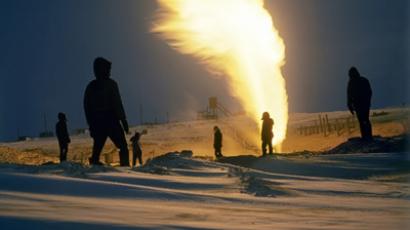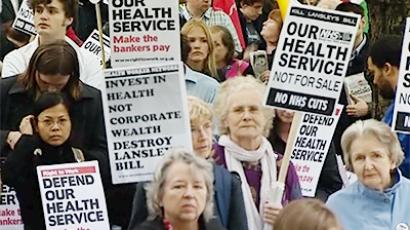Crude Western interests in Libya
The fight is not over in Tripoli, but the carve-up of Libya's vast oil riches - the biggest in Africa - is already beginning and no doubt the process will not come cheaply for the Libyan people.
The Italian Foreign Minister fired the starting gun, saying Italy's ENI oil company will play the number-one role in the region.British PM David Cameron already delivered a promise, seen by many as more of a threat, that the NATO mission in Libya, which is “to protect civilians,” will continue for “as long as it is needed” to ensure a safe transition to democracy. As allied forces lend air support to the rebels to take Tripoli, the Stop the War Coalition warns Libyans not to expect that they are getting something for nothing.“The Western powers do not do this without asking for a payback. Why is it that the head TNC [Transitional National Council] is running off to Paris to meet with the French President?” questions John Rees from the Stop the War Coalition. “Well of course that is one very important issue that was why the Western powers and Tony Blair and others struck a deal with Gaddafi in the first place. It will be exactly what they're seeking to continue with the TNC to further exploit those oil riches.”
The British government makes no secret of the fact that its motives in supporting the rebels are not entirely altruistic. Last year alone the UK exported around US$40 billion worth of goods and services to North Africa and the Middle East. But “black gold” is the key – Libya has the largest oil reserves in Africa.“When Western powers look at the region, they talk about humanity and democracy, but they’re thinking about oil,” reveals Greg Muttitt, War on Want campaigns and policy director.Muttitt says it is impossible not to draw a comparison with Iraq. He has written a book about the aftermath of the Iraq invasion, in which he maintains Western powers imposed a democracy which played on sectarian divisions. That ensured years of tribal struggle, but meant the allies retained control of the oil supply. While the UK government insists lessons have been learnt from Iraq, Western oil firms are moving into Libya.Even before the fate of Tripoli is sealed, the great oil grab is already beginning. BP has a contentious oil and gas exploration contract in Libya, which the UK government will be anxious for it to resume. Italian oil giant ENI is the first to send staff back to Libya, and its shares rose on the news. France’s Total and Austria’s OMV also did well as investors hoped they would soon be able to resume production in Libya. But at what price to the Libyan people? “The great fear is that just as they did in Iraq they'll create a democracy that serves British interests or the West’s interests or the oil companies’ interests and does nothing for the people of Libya,” Greg Muttitt explains.














